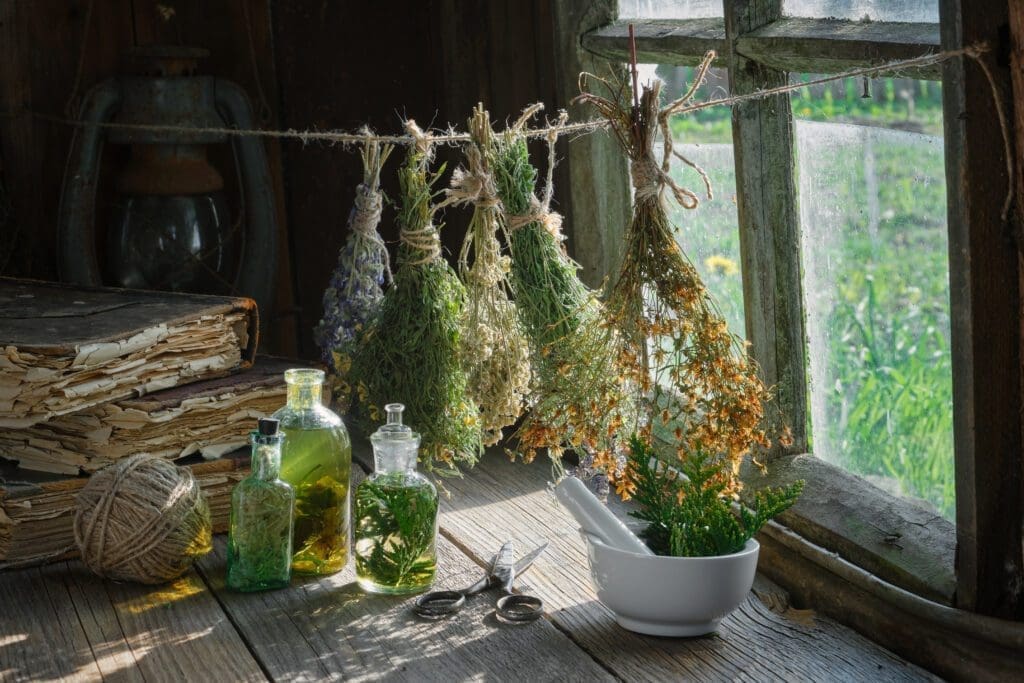Herbal remedies have been around for centuries, and with good reason. These natural foods can help alleviate various health issues without the harmful side effects of pharmaceutical drugs. But with so many options, how do you choose which one to use? In this guide, we’ll cover everything you need to know about using herbal remedies for your health. From the benefits of using them and how to choose the right ones to top herbal remedies for specific health issues and where to buy them, we’ve got you covered. We’ll also discuss common side effects and precautions when using herbal remedies and their role in nutrition. By the end of this guide, you will better understand how to use herbal remedies safely and effectively for optimal health.
What are Herbal Remedies?
Herbal remedies are natural medicines derived from plants or herbs used for centuries to treat various health conditions. They can be consumed as teas, capsules, tinctures, or applied topically. However, it is advisable to seek guidance from healthcare professionals before using them to ensure safety and efficacy.
Benefits of Using Herbal Remedies
Natural remedies offer a cost-effective and safe alternative to conventional medicine. With benefits ranging from minor ailments to chronic illnesses, herbal medicine promotes overall wellness. These extracts and tablets do not cause severe side effects by supporting the body’s natural healing processes.
https://nccih.nih.gov/health/providers/digest/herb-drug
How to Choose Herbal Remedies
Researching the properties of herbs and their best-suited forms is crucial while selecting herbal remedies. To ensure safety, always opt for sustainably sourced and organic herbs. Before trying new brews, consult a healthcare professional to understand potential side effects and contraindications. For maximum benefit, choose from various forms like teas, capsules, or tinctures.
Herbal Supplements vs. Pharmaceutical Drugs
Natural herbal supplements are a safer alternative to pharmaceutical drugs as they have fewer side effects due to their organic composition. They’re effective in treating various ailments without harming the body. One must consult a healthcare professional before choosing specific herbs or tablets. Also, one must pick licensed pharmacies for purchasing natural remedies.
https://www.fda.gov/Food/DietarySupplements/UsingDietarySupplements/default.htm
Types of Herbal Remedies
Herbal medicine is available in many forms like herbal teas, tablets, extracts & capsules. Teas are great for digestive issues & anxiety, while creams can relieve pain. Research the specific herb before use. Herbal remedies have been used traditionally with a significant effect worldwide, including in India and Europe.
Importance of Herbal Potency
Herbal remedy potency depends on growing conditions, harvesting methods, freshness, and processing techniques. Choose high-potency herbs from reputable brands and trusted U.K. or European suppliers for the best results. To avoid side effects, consulting with a healthcare professional is essential to determine the proper dosage and usage.
Top Herbal Remedies for Health
Herbal medicine has become increasingly popular in the U.K. due to its wide range of health benefits. Some top herbal remedies include echinacea for immunity support, garlic for heart health and immune system support, turmeric for reducing inflammation and joint pain relief, ashwagandha for sleeping disorders, ginkgo biloba for brain function improvement, and feverfew for migraine prevention. Always consider potency and quality when choosing from various herbal extracts and supplements.
Ginkgo for Brain Function
This herbal remedy, which traditionally improves brain function, effectively enhances cognition & memory while reducing Alzheimer’s symptoms. It improves blood flow & acts as an antioxidant. Available in capsules, extracts & teas; consult your health professional before use.
Ginseng for Energy and Stamina
This energy-booster herb extract has been used for ages to reduce fatigue and improve cognitive function. It regulates blood sugar levels, reduces inflammation, and is available in capsules, quotes, or tea. For safety, consult a health professional before taking any herbal supplement—secondary key terms: supplements, herbal medicine, extracts, pharmacist, migraine.
Valerian & Ashwaganda for Sleep Disorders
Valerian & ashwaganda, a popular herb for insomnia, increases GABA levels promoting relaxation and sleep. Available in various forms like capsules, teas & tinctures, it’s generally safe but may cause drowsiness. Please consult a health professional before its use.
Echinacea for Immune Support
Boost your immune system naturally with echinacea. This powerful herbal remedy stimulates white blood cell production to help fight infections. Echinacea comes in many forms, including supplements and teas. Before trying new herbal remedies, consult a healthcare professional for expert guidance.
Herbal Remedies for Specific Health Issues
For centuries, people have turned to herbal medicine to treat various conditions. Chamomile helps combat anxiety and stress, feverfew eases migraines and headaches, and echinacea boosts immunity. Turmeric reduces inflammation, and ashwagandha acts as a sexual booster, but it’s important to use herbal remedies correctly and seek guidance from a health professional before trying something new.
Chamomile for Anxiety and Stress
Chamomile has been a natural remedy for centuries to treat anxiety and stress. Its calming properties help soothe the mind and body, aiding relaxation and sleep. Chamomile tea is a popular way to consume this herb, while capsules and tinctures are also available. However, always consult a healthcare professional before using chamomile or any other herbal remedy for anxiety or other ailments.
Feverfew for Migraines and Headaches
Feverfew, an herb commonly used for easing migraine and headaches, reduces their severity by relaxing blood vessels in the brain while decreasing inflammation. Its positive effects are visible after a few weeks of regular use. One can consume it as tea or capsules, or tinctures. (Secondary key terms used: tea, capsules, tinctures, positive effects, regular use)
Turmeric for Inflammation
Turmeric, an herbal medicine, has traditionally been used in India for its anti-inflammatory properties. Curcumin, the active ingredient in turmeric, reduces inflammation and is found in tablets, capsules, and extracts. It’s crucial to consult with a health professional before using it to avoid side effects. Other remedies include ginseng and chamomile.
Where to Buy Herbal Remedies
When choosing trusted brands from licensed and regulated suppliers is crucial. Check the packaging for dosage and ingredient information before purchasing tablets or extracts online or at a pharmacy. Also, consider reaching out to a health professional via email for advice on supplements without side effects.
Online Pharmacies vs. Physical Stores
When choosing herbal remedies, deciding whether to buy from online pharmacies or physical stores is essential. While online pharmacies offer convenience and a more comprehensive selection of herbal remedies at lower prices, physical stores allow you to examine the product before purchasing and get knowledgeable staff’s personalized recommendations. Choose what works best for your needs.
Quality and Potency of Herbal Products
Ensuring their quality and potency is essential when buying herbal supplements. Opt for certified organic or wildcrafted products with active ingredient concentration on the label. Choose reputable brands with sustainable practices and consult a qualified herbalist or healthcare professional before use.
Common Side Effects of Herbal Remedies
Awareness of potential side effects when using natural supplements is crucial. These remedies can cause nausea, dizziness, and allergic reactions like prescription drugs. Ensure you check the concentration of active ingredients before consuming them. Consult a pharmacist or health professional before taking herbal tablets or extracts.
How to Minimize Side Effects
It’s crucial to follow recommended doses and consult a health professional before taking them to minimize herbal remedies’ side effects. Take note of possible interactions with medication or supplements you’re already taking. If symptoms persist or worsen, discontinue use and seek medical attention.
Precautions When Using Herbal Remedies
To safely use natural remedies from plants or herbs, consult a health professional before taking tablets or extracts. Purchase from reputable pharmacies via email or online to ensure safe packaging and quality assurance. Monitor for side effects such as nausea or bleeding when taking remedies like ginseng, valerian, or turmeric. Be mindful of interactions between herbal supplements and conventional antibiotics and aspirin. Some supplements can be effective against premenstrual syndrome, migraine, or weight loss.
Possible Interactions with Medications
It’s crucial to consult with a health professional about possible interactions with other medications to ensure the U.K.’s safe use of herbal remedies. Interactions can cause bleeding or affect blood pressure levels. Herbs like St. John’s Wort, Ginseng, and Echinacea may interact with certain medicines. A careful reading of instructions is necessary.
Dosage and Duration of Use
It is essential to follow the recommended dosage and duration of use to ensure that herbal remedies do not cause any side effects. Dosages may vary based on specific herbs, such as capsules or extracts, age, and health status. It is advisable to seek advice from a health professional before taking supplements and remember to stop if you experience any discomfort while using these herbs and start again once you feel better.
Herbal Remedies and Nutrition
Herbal remedies play an important role in achieving optimal nutrition. These natural supplements have been used for centuries to supplement a balanced diet and improve overall health. Active ingredients like ginseng and turmeric can reduce inflammation, boost antioxidant activity, and even aid in weight loss. However, it’s crucial to be aware of potential side effects like bleeding or nausea and consult a healthcare professional before use. Additionally, considering traditional services like acupuncture or aromatherapy can help ensure their safe use.
Importance of a Balanced Diet
A balanced diet is vital for good health. Nutrient-dense foods like dandelion (potassium) and nettle (iron) can boost the efficiency of these natural superfoods. However, consult a health professional before using these supplements and avoid high doses or long-term usage to prevent side effects. If you feel discomfort, stop using them until you return to normal.
Frequently Asked Questions
- What are herbal remedies, and how do they work?
- What are their benefits, risks/side effects?
- How do you choose the right one?
- Where can you find high-quality tablets or extracts online or from a pharmacy?
Are Herbal Remedies Safe?
Herbal remedies can be safe if used correctly and purchased from reputable sources. However, they may interact with medication or have side effects, so it’s vital to consult a healthcare professional and read labels carefully. Although not regulated like prescription drugs, with proper guidance, herbal remedies can improve health.
Can Herbal Remedies Cure Diseases?
While herbal remedies may aid in managing and preventing health issues, they are not a one-size-fits-all solution to cure diseases. It’s crucial to consult with a healthcare professional before using them, especially if you have pre-existing conditions or take medication. They should not replace conventional medical care. The effectiveness of herbal remedies will vary based on individual needs and research evidence.
Conclusion on Using Herbal Remedies UK Safely and Effectively
Effective use of herbal medicine involves consulting a health professional for research-backed dosage guidelines and high-quality supplements. Be mindful of potential interactions with antibiotics, blood pressure medication, or aspirin. Monitor for nausea, bleeding, or liver problems. Herbal remedies are a traditional medicinal alternative and should complement conventional medicine.
Additional Resources on Herbal Extracts and Supplement Tablets
Many resources are available if you’re searching for more information on herbal remedies and supplements. Join online forums, read blogs and books, or consult an alternative medicine practitioner to learn from their expertise. These sources can offer advice on using herbal remedies safely and effectively without causing side effects.
- https://nimh.org.uk/_resources/becoming-a-herbalist/
- https://www.sciencedirect.com/science/article/abs/pii/S1744388109000516
- https://beevitalpropolis.com/
Conclusion
Herbal remedies can be a great way to support your health naturally. They offer a range of benefits, from boosting brain function and energy to supporting immune function and reducing inflammation. However, choosing suitable remedies for your needs and using them safely and effectively is essential. Always consult a healthcare professional before using herbal remedies, especially if you’re taking medications or have existing health conditions. To learn more about using herbal remedies safely and effectively, check out our additional resources on natural supplements and natural health solutions.



